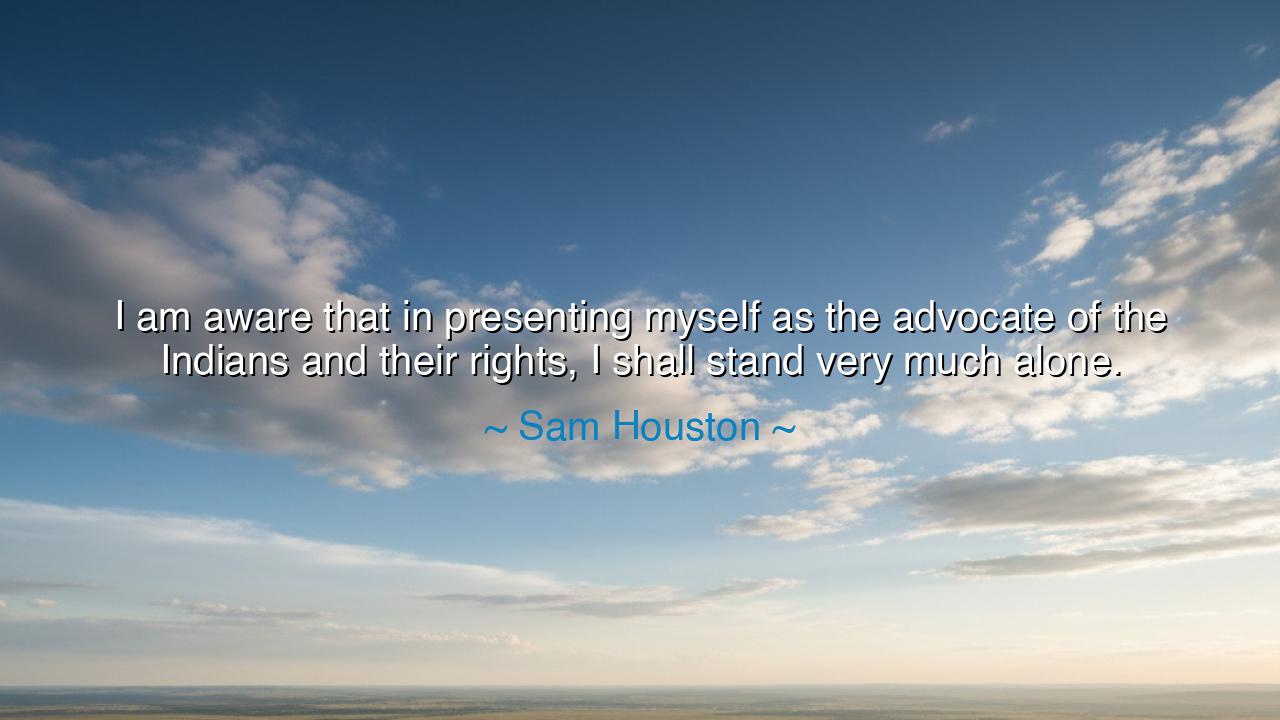
I am aware that in presenting myself as the advocate of the
I am aware that in presenting myself as the advocate of the Indians and their rights, I shall stand very much alone.






In the solemn and courageous words of Sam Houston, warrior, statesman, and guardian of conscience, we hear a truth that resounds across the ages: “I am aware that in presenting myself as the advocate of the Indians and their rights, I shall stand very much alone.” These are not the words of a man seeking praise, nor the boast of one intoxicated by righteousness—they are the quiet confession of a soul prepared to bear the weight of isolation in the service of justice. Houston knew, as few men do, that to defend the oppressed is to invite the scorn of the powerful; to stand with the forgotten is often to stand alone. Yet he chose that solitude, as prophets and visionaries have before him, for he knew that truth is not measured by company, but by courage.
Sam Houston spoke these words in an era of thunderous expansion and moral blindness. It was the mid-nineteenth century—an age when the dream of Manifest Destiny swept across the American continent like a flood, drowning the ancient peoples of the land beneath its tide. The Native tribes were being driven from their homes, their treaties broken, their dignity trampled beneath the march of conquest. Houston, once a soldier under Andrew Jackson, had seen these people not as caricatures of savagery, but as human beings of wisdom, faith, and honor. He had lived among the Cherokee, had learned their tongue, had married one of their own, and had found in their culture a nobility the world refused to see. Thus when he rose to defend them before his peers in government, he did so knowing full well that his voice would echo in emptiness—that the halls of power had no ears for compassion.
When he declared that he would “stand very much alone,” Houston did not exaggerate. His advocacy for Native rights brought him ridicule and political isolation. Many of his contemporaries viewed his empathy as weakness, his fairness as betrayal. But Houston’s courage was born not of popularity, but of principle. He understood what every just man must eventually learn—that there are battles worth fighting even when the world calls them lost. In defending the rights of the Indians, he was not merely protecting a people; he was defending the soul of his nation from the poison of its own greed. He knew that a country that destroys the innocent cannot long preserve its own honor.
History has many who have stood in similar solitude. Consider Bartolomé de las Casas, the Spanish friar of the sixteenth century, who raised his voice against the enslavement and slaughter of the Indigenous peoples of the Americas. Like Houston, he was denounced by his countrymen, accused of treachery, mocked for his compassion. Yet he persisted, because the love of truth burned brighter than the fear of loneliness. In every age, there are those who walk this narrow path—the few who will stand against the multitude, who will bear rejection for the sake of mercy. Such souls form a silent brotherhood across centuries, bound not by nation but by moral courage.
Houston’s words remind us that righteousness often demands solitude. The one who chooses to see clearly in a world blinded by prejudice must learn to endure the chill of isolation. Yet, paradoxically, it is in that solitude that one draws closest to the eternal. For when all earthly allies fall away, one discovers the companionship of conscience, and hears, in the quiet of the heart, the approval of God. Houston’s choice was not easy, but it was holy. His loneliness was the cost of integrity, and though his contemporaries may not have honored him fully, time itself has vindicated his spirit. The legacy of justice always outlives the comfort of conformity.
The lesson, then, is clear and timeless: to stand for what is right, even when alone, is to walk the path of the brave. The measure of a person’s worth is not how many stand beside them, but what truth they stand upon. When injustice prevails, silence is complicity, and fear becomes the handmaiden of evil. Be therefore like Houston—steadfast, compassionate, and willing to bear the solitude of righteousness. Let your heart be your compass, not the clamor of the crowd.
So remember this, O children of a restless world: truth is often lonely at first, but it is never abandoned. The heroes of history were not those who followed the multitude, but those who defied it in the name of conscience. Stand, therefore, when standing is hard. Defend the voiceless, even if no one applauds. For as Sam Houston knew and lived, the one who stands alone for justice does not stand alone forever—he stands with the timeless company of the righteous, whose courage lights the road for all who come after.






AAdministratorAdministrator
Welcome, honored guests. Please leave a comment, we will respond soon